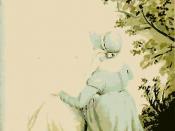To demonstrate the importance of sense in the 19th century society, Jane Austen's "Sense and Sensibility" presents the reader with contrasts between characters who initially epitomise sense and sensibility. The actual plot revolves around events that occur in these characters lives, these characters being Elinor Dashwood (sense) and her younger sister Marianne Dashwood (sensibility). The two sisters undergo their own series of situations which happen to be comparable and so the reader is able to witness how each one responds or behaves as well as the consequences of their respective actions. The differences between sense and feeling are emphasised particularly by how they behaved with their suitors and also their reactions towards their own personal disappointments of broken romance. However it also deals with the individual balancing both sense and sensibility in order to function and engage within the society. Underlying these main theme are the complexities of love and marriage in 19th century England.
When Elinor says "Lucy does not want sense; and that is the foundation on which all good things are built" she indirectly refers to a certain proper code of conduct that needed to be practised in the society in Dashwood sisters lived, in order to be recognised as a civilised, well-bred young girl. In Elinor's eyes, the way Marianne unashamedly expresses her interest and attraction to Willoughby severely breeches that proper code of conduct as she lacks the sense to handle her relationship discreetly. Austen condemns Marianne's behaviour through the use of irony. One such instance of the irony is occurs in the passage where Mrs Dashwood says to Elinor in regards to Willoughby "Is he not a man of honour and feeling? Has there been any inconsistency on his side to create alarm? can he be deceitful?" Actually, Willoughby proves to be...


